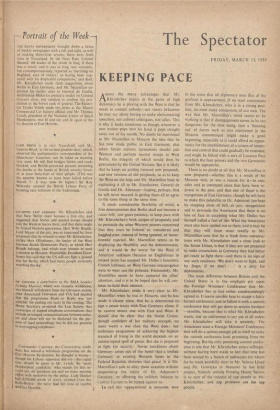KEEPING PACE
AtoNG the many advantages that Mr. Khrushchev enjoys in the game of high diplomacy he is playing with the West is that he needs to consult nobody—not voters (whatever he may say about having to make electioneering speeches), not cabinet colleagues, not allies. This is why it looks sometimes as though whenever a new notion 'pops into his head it pops straight away out of his mouth. No doubt he mentioned to Mr. Macmillan in Moscow the idea that he has now made public in East Germany, that token Soviet military formations should join Western and perhaps neutral troops in West Berlin, the integrity of which would then be guaranteed by the United Nations. But it is likely that he keeps on putting forward new proposals, and new versions of old proposals, so as to keep the West on the hop, and Mr. Macmillan busy in explaining it all to Mr. Eiserihower, General de Gaulle and Dr. Adenauer—hoping, perhaps, that he will never succeed in getting them all to agree to the same thing at the same time.
It needs considerable flexibility •of mind, a firm determination that Berlin shall not become a cams belli, and great patience, to keep pace with 'Mr. Khrushchev's brisk output of proposals, and to persuade the other Western powers concerned that they must be listened to, considered and haggled over, instead of being ignored, or incon- tinently rejected. Mr. Macmillan seems to be displaying the flexibility and the determination, and it would be the worse for the West if American sulkiness (because an Englishman in striped pants has usurped Mr. Dulles's function), French loftiness, or West German intransigence were to wear out the patience. Fortunately. Mr. Macmillan seems to have captured the allies' attention, and it is to be hoped that he will con- tinue to hold their interest.
Mr. Khrushchev made it very clear to Mr. Macmillan when he was in Moscow, and he has made it clearer since, that he is determined to sign a peace treaty with East Germany alone, if he cannot secure one with East and West. -It 'shOuld also be clear that the Soviet Union, though confident of her military strength, no more wants a war than the West does: her ambitious programme of achieving the highest standard of living in the world depends on an uninterrupted spell of peace. But she is prepared to fight for security: , Soviet touchiness about Germany arises out of the belief that a unified Germany or existing Western bases in the Federal Republic threaten that peace. It is Mr. Macmillan's task to allay those anxieties without jeopardising the safety of Dr. Adenatier's Germany, or allowing the military balance in Central Europe to he tipped against us.
To call this 'appepsement' is nonsense, save in the sense that all diplomacy save that of the gunboat is appeasement. If we want concessions from Mr. Khrushchev, who is in a strong posi- tion, we must make concessions of our own. The way that Mr. Macmillan's mind seems to be working is that if disengagement seems to be too dangerous for the time being, then a 'thinning out' of forces such as was mentioned in the Moscow communiqué might make a good beginning, especially as it could afford an oppor- tunity for the establishment of a system of inspec- tion and control that could gradually be extended, and might be linked with a sort of Locarno Pact to which the four powers and the two Germanies would be signatories.
There is no doubt at all that Mr. Macmillan is now prepared—whether this is a result of his Moscow visit, or was a reason for it—to con- sider and to commend ideas that have been re- jected in the past, and that one of these is the recognition of East Germany, though he will have to make this palatable to Dr. Adenauer (perhaps by stopping short of full, de jure, recognition) and to persuade the Americans that there is no loss of face in accepting what Mr. Dulles has himself called a fact of life. What the Americans must also have spelled out to them, and it may be that they will listen more readily to Mr. Macmillan now -that he is fresh from conversa- tions with Mr. Khrushchev and a close look at the Soviet Union, is that if they are not prepared to make concessions in Germany they had better get ready to fight there—and there is no sign of any such readiness. 'We don't want to fight, and by Jingo, if we don't . . .' is a ditty for diplomatists.
The main difference between Britain- and the United States is in the emphasis put upon the Foreign Ministers' Conference that Mr. Khrushchev has at last rather- condescendingly agreed to. It seems sensible here to accept a fairly formal conference, and to follow it with a summit conference that will get-down to serious business —sensible, because that is what Mr. Khrushchev wants, and no conference is any use at all unless Mc. Khrushchev -will take it seriously. The Americans want a Foreign Ministers' Conference that will do a se,rious enough job in itself to make the summit conference look promising from the beginning. But the only promising summit confer- ence is one that Mr. Khrushchev enters willingly. without having been made to feel that time has been wasted by a bunch of politicians for whom (as he made painfully clear to Mr. Selwyn Lloyd and Mr. Gromyko in Moscow) he has little respect. Nobody outside Printing House Square is so sure of the topness of top people as Mr. Khrushchev, and top problems are for top people.


















































 Previous page
Previous page